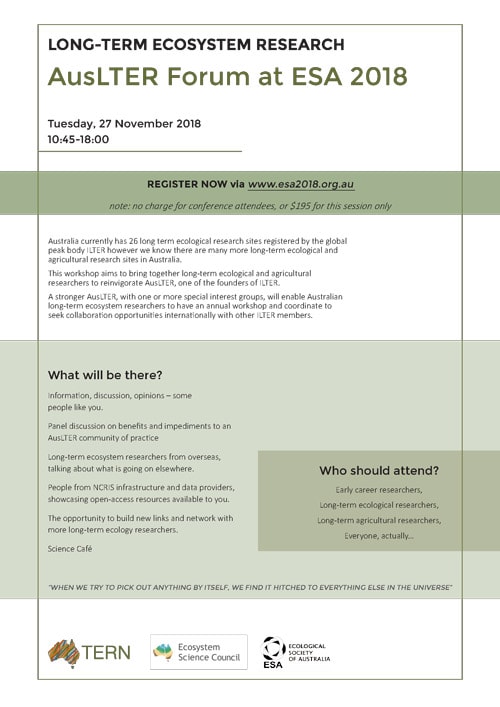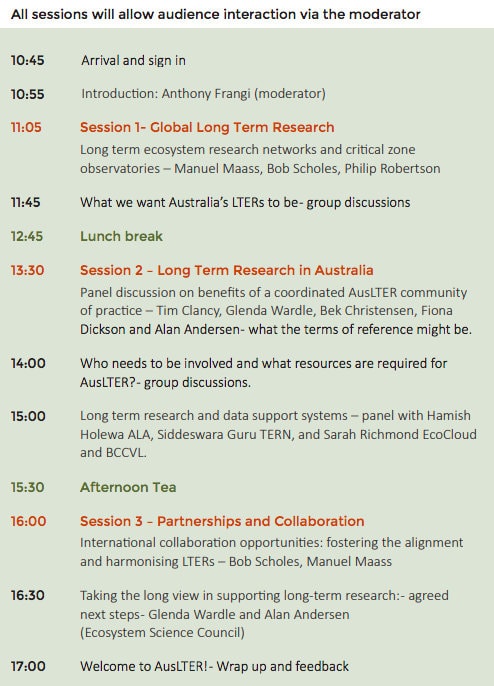With this year’s Ecological Society of Australia conference kicking off at the end of November, it’s high-time to showcase all the TERN related events happening at the conference. Take part in the long-term research forum and our data workshop, learn about our data skills development program, or just drop by our booth and say hello.
‘Ecology in the Anthropocene’ is the theme of this year’s annual conference of the Ecological Society of Australia (ESA). Held in Brisbane from 26 to 30 November, the 2018 conference will feature research from the nation’s brightest minds on the function, change and management of our natural ecosystems during the current human epoch.
“Working out how people and nature can coexist on planet Earth is surely the grandest of all society’s challenges” writes Prof Richard Fuller of the University of Queensland in his conference introduction. “At the conference we will explore how natural ecosystems function, how human activity has impacted them, and what can be done to reverse the biodiversity crisis.”
TERN is proud to continue its affiliation with ESA’s annual conferences and is sponsoring the conference’s opening symposium on Monday the 26th on ‘measuring and mapping ecological condition through space and time’ convened by Dr Michael Drielsma and Dr Kristen Williams.
We will also have a booth and staff on hand to answer your questions and share information on our open-access research infrastructure.
At the TERN booth we’re excited to be launching the ‘TERN–ANU Landscape Data Visualiser’, a web-based mapping tool for discovering and analysing the extensive range of landscape-scale ecosystem data sets provided by TERN and the Australian National University (ANU).
The new visualiser includes Australia-wide data on land cover, fire occurrence, land surface and soils, agriculture, climate, inundation, river flows and several water and carbon stores and flux datasets. Be sure to drop by the TERN booth try out the new collaborative tool for yourself.
There are also two exciting TERN events on during the week that everyone’s invited to:
In addition, a number of presentations throughout the week describe advances in Australian ecosystem science enabled by TERN’s infrastructure. A complete list of these presentations, their times and locations is below.
We look forward to seeing you at this year’s ESA… Not going to ESA this year? Don’t worry, you can follow all the action via Twitter using the hashtag #ESAus18 and by following @TERN_Aus.
AusLTER Forum at ESA 2018
Date: Tuesday 27 November 2018
Time: 10:45 – 18:00
Participation Fee: Free with ESA registration. $195 to ONLY attend the AusLTER Forum.
Australia currently has 26 long-term ecological research sites registered by the global peak body ILTER, however, we know there are many more long-term ecological and agricultural research sites in Australia.
Feedback from recent International Long-Term Ecological Research (ILTER) network meetings indicates that Australia is leading the way in many areas of infrastructure provision and data capture. It also suggests that we share some of the challenges of ensuring national and global collaboration for site registration and use of data.
This forum will enable the long-term ecological research community to discuss strategies and structures that will position the community to work together locally, nationally and internationally.
This forum aims to bring together long-term ecological and agricultural researchers to reinvigorate AusLTER, one of the founders of ILTER.
A stronger AusLTER, with one or more special interest groups, will enable Australian long-term ecosystem researchers to have an annual workshop and coordinate to seek collaboration opportunities internationally with other ILTER members.

Program:

Register via esa.org.au:
If you have a full or day registration for ESA18, you are welcome to attend the forum as part of your registration.
If you will ONLY attend the AusLTER Forum on 27 November 2018, please purchase a special ticket ($195) via the registration page at esa.org.au. Note that you will need to sign in or create a new account to purchase the ticket.
It would be great to know if you are planning to attend this workshop! Do let us know via email.
Australian terrestrial ecological data: Where to get it and how to use it
Date: Friday 30 November 2018
Time: 9:00 – 12:30
Participation Fee: $20 per person (refunded on the day via vouchers)
In this hands-on workshop participants will explore how to access, understand, and use datasets from two TERN platforms, Ecosystem Surveillance and Landscapes. In both cases, R will be used to programmatically acquire, manipulate, display, and analyse the data.
The TERN Ecosystem Surveillance section will explore the environmental monitoring data collected from over 600 plots and the usage of the new ‘ausplotsR’ R package. Through ausplotsR, users can directly access plot-based data on vegetation and soils across Australia with simple function calls to extract the data, as well as pre-process the data for subsequent ecological analyses. Specifically, in this section of the workshop, participants will: (1) learn about the different types of TERN Ecosystem Surveillance data, their structure, and coverage; (2) programmatically obtain different types of data; (3) display data (including geographical representations); (4) prepare data for ecological analysis; and (5) conduct some simple ecological analyses including exploring the relationship between vegetation cover and latitude, investigating the change in vegetation cover over time, and creating and using species occurrence by site matrices for simple biodiversity and community ecology analysis.
In the TERN Landscapes section of the workshop participants will use remotely sensed data to explore the changes in Normalized Difference Vegetation Index (NDVI) over time. First, seasonal surface reflectance images will be used to compute NDVI values at the beginning and end of a 10-year period. Then the change in NDVI in this period of time will be calculated and visualised. Finally, participants will use another remotely sensed dataset, a time series of green cover, to investigate what is happening in the area with the most noticeable change in NDVI in the 10-year period. In the process we will learn how to programmatically acquire, manipulate, combine, explore, reproject, visualise, summarise, and use for raster data calculations.
The workshop will conclude by the participants sharing their experiences and problems encountered, followed by TERN’s recommendations for additional data skills development.
Although knowledge of R is not compulsory, participants will benefit from a prior knowledge of R.
This workshop constitutes part of the TERN’s Data Skills Development Program (DSDP). The program facilitates the discovery, understanding, integration and re-use of TERN’s large volume of heterogeneous data by its users.
Presentations at ESA18 featuring TERN
The following presentations all feature research using TERN infrastructure, data or expertise. Some are given by TERN staff, but the majority by TERN users.
Monday, 26 November 2018
SYMPOSIUM: Measuring and mapping ecological condition through space and time (1)
11:00 AM – 1:00 PM Hall A
Jacqui Stol – Checking for Change (C4C) A new ecological condition assessment method enabling short-term adaptive management.
2:00 PM – 2:45 PM Hall B
Glenda Wardle – Ecosystem forecasting: something for everyone
SYMPOSIUM: Measuring and mapping ecological condition through space and time (2)
3:45 PM – 5:45 PM Hall A
Peter Brenton – Standardised collection of ecological condition data, an information supply chain perspective
3:45 PM – 5:45 PM Meeting Rooms 4-5
Aaron Greenville – Dynamics, habitat use and extinction risk of the kowari are revealed by long-term monitoring
Tuesday 27 November 2018
SYMPOSIUM: Assessing impacts and facilitating adaptation of biodiversity to climate change (1)
10:45 AM – 12:45 PM Hall A
Sarah Richmond – Innovative cloud-based tools for ecological modelling
Drought Impacts and Thermal Tolerance
1:30 PM – 3:30 PM Meeting Rooms 4-5
Thomas Pyne – Local adaptation to climate in Sydney sandstone plant species
SYMPOSIUM: Tracking species and ecosystem change to inform effective environmental management (1)
1:30 PM – 3:30 PM Hall B
Elisa Bayraktarov – A Threatened Species Index for Australian Birds
Ayesha Tulloch – What indicators do we need to adequately track and manage biodiversity
SYMPOSIUM: Assessing impacts and facilitating adaptation of biodiversity to climate change (3)
4:00 PM – 6:00 PM Hall A
Adrienne Nicotra – Thermal tolerance of land plants: A systematic review
Wednesday 28 November 2018
SYMPOSIUM: Why won’t people just listen to me? Integrating ecology into environmental decisions
11:00 AM – 1:00 PM Hall A
Pete Lyon – Biodiversity reporting, decisions and now accounting…will we ever get it right?
Thursday 29 November 2018
Revisiting the holy grail: do functional traits predict ecological processes?
11:00 AM – 1:00 PM Meeting Room 6
Amy Zanne – Relative controls on wood decay: plant traits, environment and microbial communities
Quantitative Ecology Showcase (4)
11:00 AM – 1:00 PM Meeting Room 7
Rachael Gallagher – Rainfall predictability and plant range boundaries
Ayesha Tulloch – Weighing the costs and benefits of small versus big data for monitoring ecological change
Quantitative Ecology Showcase (5)
3:30 PM – 5:30 PM Meeting Room 7
Bernardo Blanco-Martin – Facilitating the use of Australian terrestrial ecological data: TERN and its Data Skills Development Program
Belinda Medlyn – Why Near-Term Ecological Forecasting?







